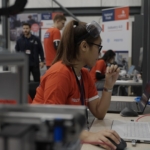Of all the challenges facing our economy in the coming years, there is one which brings consensus across the political divide: the need to improve our productivity. The IPPR’s report yesterday ‘A new vision for the British economy’ highlighted how UK productivity is ‘world-lagging’, trailing the G7 average by 13% and flatlining for the past decade. Meanwhile, during Prime Minister’s Questions, Conservative MP Mark Harper called on the Prime Minister to bring forward proposals for productivity rises across government in time for November’s Budget. As the Prime Minister said in her reply: ‘productivity is crucial to the strength of our economy and to improving it going forward’.
Why does productivity matter so much? Put simply, the more productive our workforce is, the stronger our competitive advantage and the greater our appeal to inward investors. Brexit of course compounds the need to place a laser focus on productivity improvements as major EU nations like France and Germany will become more open as our direct rivals for trade and investment. According to latest ONS data, UK productivity is 22.7% lower than France’s and 26.7% lower than Germany’s. Numbers like this make for stark reading and underline why there is recognition across the political spectrum that we can no longer afford to be the sick man of Europe where our productivity is concerned.
So, what can be done about this? Part of the answer lies in focusing on workers’ mindsets as productivity measures are a reflection of individual contributions to a business’s output. At WorldSkills UK mindset training is fundamental to the broader training programme the young people who take part in our skills competitions undertake. All 34 of the apprentices who are going out to the ‘skills olympics’ in Abu Dhabi next month have received comprehensive coaching on the psychological dimension to the high pressured challenge ahead of them. This applies lessons from elite sport where it has long been apparent that technical excellence is a prerequisite but not a sufficient precursor to success. World-beating performances are a combination of technical skills, physiological well being and crucially mindset. We are keen to bring this mindset training to the workplace. It will meet employer needs by enhancing employability and productivity skills, above and beyond technical attributes. We envisage the development and delivery of a range of packages of varying levels, lengths and scope, to meet the needs of different markets, and we are keen to develop this process with key partners. So, watch this space.
The businesses we work with at WorldSkills UK – like Airbus, BAE Systems and Toyota – and are leading edge as they are actively committed to benchmarking against the best standards worldwide to drive their productivity and international competitiveness – they know that entering their young people into skills competitions delivers results. Briggs & Forrester, the £180m turnover building services specialists, enter their apprentices into the UK national finals to encourage them to be the best. Crucially, Briggs & Forrester see productivity gains from their apprentices’ involvement in competitions. According to the firm’s workforce manager, Pete Curtis: ‘through competing in pressured conditions we see an improvement in productivity and quality of their work, which raises the bar among fellow apprentices on what can be achieved. This develops greater employee engagement all around, with a raised level of ambition and enthusiasm among apprentices – resulting in a high performance culture’. Briggs & Forrester are now working with us to embed our competition methodology across the business. The conditions apprentices face when competing – time pressure, high quality standards, rigorous assessment – are ideal for improving productivity as they encourage the completion of everyday business tasks with greater speed and accuracy.
Electroimpact – whose customer base includes Airbus, Boeing and Bombardier – is another business with a significant UK presence that has seen its apprentices go further, faster through competitions. Matt Booth, their UK manufacturing lead has spoken of how national finals preparation meant apprentices ‘came back to the job they were working on, applied the training and knocked 20 minutes off a two-hour machine cycle time’. It’s exactly this kind of instant productivity gain that we need to be driving across the economy. The UK’s productivity gap is so wide that we need quick fixes as well as long-term solutions – WorldSkills UK has the know how to deliver both. Productivity gains are achieved through employees raising their games and being able to deliver against the clock and against targets – it’s a highly pressurised scenario. Matt has used competitions to push his apprentices to hone their skills and improve efficiency: ‘they have learnt to cope with time pressures more efficiently, do machine set ups and programme them and to complete the jobs in the quickest time’.
The experience of leading, high quality businesses like Briggs & Forrester and Electroimpact is what the Government must look to as it develops the Industrial Strategy and reforms technical education and careers advice. Skills competitions are an important part of the answer in solving our productivity puzzle.


